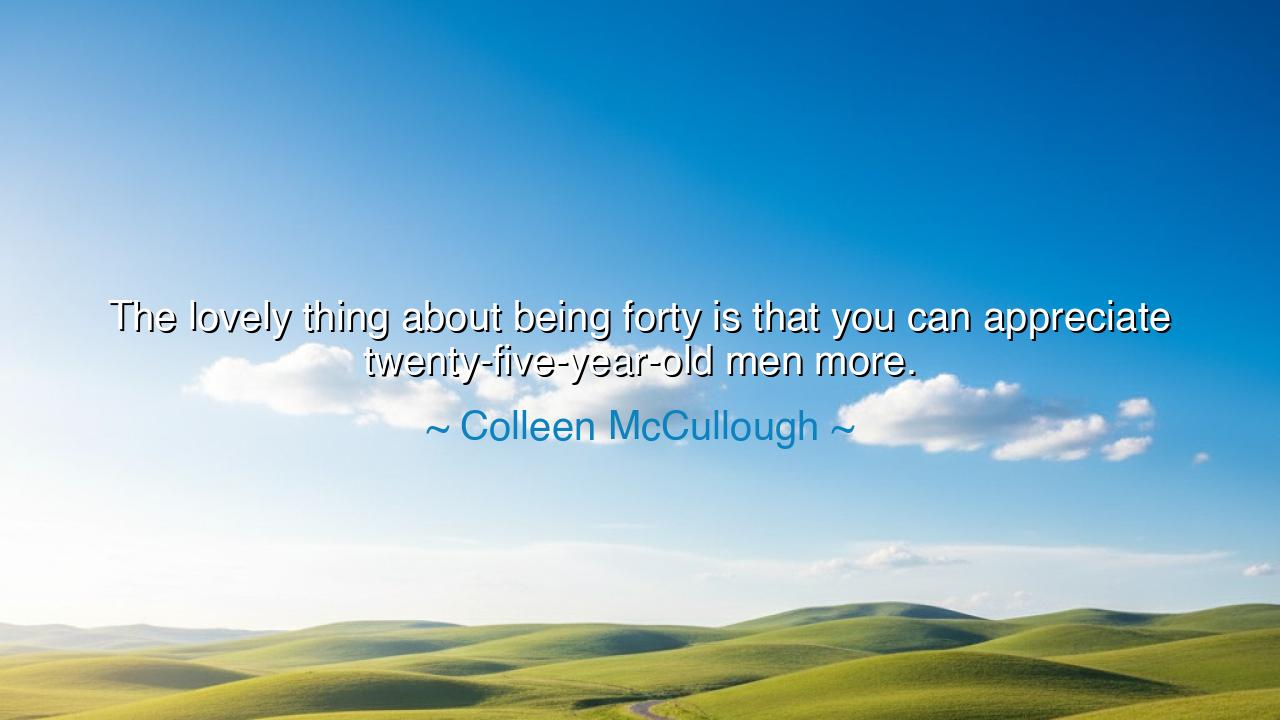
The lovely thing about being forty is that you can appreciate
The lovely thing about being forty is that you can appreciate twenty-five-year-old men more.






"The lovely thing about being forty is that you can appreciate twenty-five-year-old men more." This delightful observation by Colleen McCullough unveils a profound truth about aging: as we grow older, we gain the ability to see the beauty and appeal in things that might have seemed trivial or unremarkable when we were younger. In this quote, McCullough humorously reflects on how the passage of years allows us to appreciate life from a different perspective. When we are young, we may take certain things for granted, seeing only what is in front of us, driven by youthful passion and energy. However, as we mature, we develop a deeper sense of wisdom, and that very appreciation grows for the world around us—whether it be for youth, vitality, or the charisma of younger generations.
In youth, we often find ourselves focused on our own journey, on carving our own identity, and striving to make our mark in the world. At twenty-five, many are at the height of their ambition, eager to prove themselves and make sense of the world. But as we age, we come to realize that youth, while powerful, is also fleeting. Forty, as McCullough points out, offers a new lens through which to view youth—not with the self-centered intensity of youth itself, but with a reverence for its energy and its untapped potential. The ability to look at younger people, particularly twenty-five-year-olds, with a sense of admiration is a form of maturity that comes with understanding the passage of time and recognizing the transience of youth and beauty.
Consider the great thinkers and artists of history, who often reflected on the contrast between youth and age. Socrates, for instance, spent much of his life engaging with the young minds of Athens. In his later years, he appreciated the idealism, energy, and unblemished vision of youth, seeing in them the potential for greatness and the freedom to explore the boundaries of thought. He may not have been attracted to their youthful appearance in the same way McCullough suggests, but he certainly found in them a spark that he knew could shape the future. Socrates’ reverence for youth was not about superficial attraction, but about the promise and freshness of new generations. He could appreciate the vitality of young minds, even as his own age brought him a more tempered understanding of the world.
The same appreciation for youth is echoed in the life of Leonardo da Vinci, who, though a man of advancing age, was drawn to the vitality and potential of younger apprentices. Even as an old man, da Vinci sought out the best and brightest young minds to bring into his workshop. He saw in them the creativity, the imagination, and the fearlessness that he himself had once possessed, and it was this very youthful vigor that inspired him to keep creating, even as his years weighed upon him. Just as McCullough suggests, da Vinci’s ability to appreciate the youthful energy around him was a sign of wisdom—he understood that in the energy of youth, there is much to be celebrated and revered.
McCullough’s quote also subtly suggests that aging does not diminish desire or appreciation—it transforms it. At forty, we are not too old to appreciate the qualities of youth; we simply see them differently. The youthful frenzy of twenty-five may have once been an aspiration, a desire to be young forever, but by forty, we understand the value of youth without the desire to reclaim it. This is where the true wisdom of McCullough’s quote lies: age allows us to see beauty in the things we once took for granted, like the energy and potential of youth. We do not lose the ability to enjoy life’s pleasures as we age; we simply grow to appreciate them in a deeper, more meaningful way.
The lesson here is not just about admiring youth, but about understanding the power of perspective. As we age, we gain a deeper appreciation for what we once thought we knew. The world becomes more complex, more layered, and the things we once overlooked or took for granted are now seen as precious and worthy of admiration. Just as McCullough cherishes the youthful energy of twenty-five-year-olds, so should we seek to find beauty and joy in every phase of life. Whether we are in our twenties, forties, or seventies, we must celebrate what each stage of life brings, knowing that our perspective continues to evolve and deepen as we grow older.
In practical terms, this means that we should cultivate the habit of embracing each moment, each phase of life, with gratitude and appreciation. As we grow older, let us not become jaded or dismissive of youth, but instead, find ways to mentor, inspire, and learn from the energy and optimism of younger generations. Let us not envy the youthful vigor we once had, but use our wisdom and experience to nurture the promise of future generations. Age should not separate us from the joys of life; rather, it should allow us to appreciate them in new and profound ways.
Ultimately, McCullough’s words remind us that youth and age are not opposing forces but complementary aspects of the same journey. As we grow older, we should not lose our ability to admire the energy and potential of youth, nor should we allow the vitality of our own spirit to be diminished by time. Instead, we should embrace the wisdom of maturity, which allows us to see the beauty in everything, from the fresh faces of twenty-five-year-olds to the strength we gain as we age. In doing so, we honor the passage of time, seeing each stage of life not as a loss, but as a gift to be cherished and appreciated.






AAdministratorAdministrator
Welcome, honored guests. Please leave a comment, we will respond soon